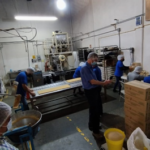By Brittney Palomarez
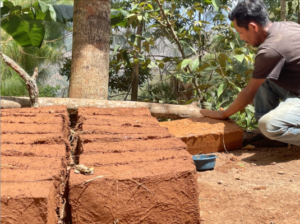
March 18
I’m writing on my last full day in Chiquimula, Guatemala. It doesn’t seem possible that the time has come to an end! The 5 days I had the pleasure of spending here were full, inspiring, emotional, and eye-opening. My first day was spent learning and understanding the importance of the work of Paz y Desarollo (PYD), an organization dedicated to the improvement of everyday life for Chapines (Guatemalans) specifically those experiencing barriers to basic human rights such as shelter, water, and food. Their work puts an emphasis on the experiences of women in rural pueblos in Guatemala and it seeks to uplift and empower them in their homes and in their communities.
A beautiful example of a female leader is Doña Julia in Dos Quebradas. I was only able to spend just a short time with Doña Julia, but in that time I could feel the love she has for her home, her neighbors, and her chickens who have become an integral part of the lives of the people who call Dos Quebradas home. Doña Julia is the primary caregiver for this flock of chickens – she knows when they are hungry, scared, sick, and happy. At this point they are part of her family and she treats them as such. The eggs that her chickens provide are collected and taken to market and sold for a fair price. It’s important to her that she helps to build up her community and that means offering her eggs at a more affordable price than can be found at a larger or more urban market. She believes it is important to find the balance between making a profit and feeding the community. For many people in the rural communities of Guatemala, eggs are a primary source for protein because other types of protein can be expensive and inaccessible, as many don’t have cars or motorcycles to get to larger urban markets. PYD continues to support Doña Julia and her efforts with help from student interns from the Universidad de San Carlos de Guatemala.
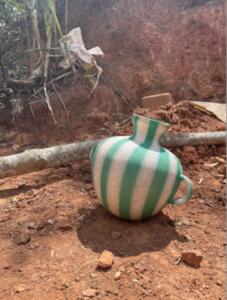 PYD dedicates a significant amount of time to identifying opportunities for economic empowerment that are informed by the needs and already present skills of the communities they serve. To me this is truly what it looks like to work in a community with people. It is authentic and aims to be sustainable. In this way the organization is always willing to meet people where they’re at currently and identify a shared goal for the future. One great way PYD workshops some of these ideas is by offering community gatherings that act as trainings and socials. Many of the members of the community in El Tular are not able to read or write, so PYD has come up with a way to honor that and find a solution. Together, community members assemble a puzzle that includes an image of something that may or may not affect their community. Once assembled, they discuss it as a group and identify possible solutions if it’s something they see in their community. Many of the puzzles focus on everyday life and the shared responsibilities of a household. This helps many of the women in the community share their voices and have a forum for how to address machismo in their homes and pueblos. Empowerment in the home leads to empowerment in the community and eventually in the larger local economy, as I got to see with Doña Julia.
PYD dedicates a significant amount of time to identifying opportunities for economic empowerment that are informed by the needs and already present skills of the communities they serve. To me this is truly what it looks like to work in a community with people. It is authentic and aims to be sustainable. In this way the organization is always willing to meet people where they’re at currently and identify a shared goal for the future. One great way PYD workshops some of these ideas is by offering community gatherings that act as trainings and socials. Many of the members of the community in El Tular are not able to read or write, so PYD has come up with a way to honor that and find a solution. Together, community members assemble a puzzle that includes an image of something that may or may not affect their community. Once assembled, they discuss it as a group and identify possible solutions if it’s something they see in their community. Many of the puzzles focus on everyday life and the shared responsibilities of a household. This helps many of the women in the community share their voices and have a forum for how to address machismo in their homes and pueblos. Empowerment in the home leads to empowerment in the community and eventually in the larger local economy, as I got to see with Doña Julia.
It is beautiful to look around a group of women and know that one or more of them has the potential to lead their community one day in the future. I feel so lucky to have been witness to that in Guatemala.
March 19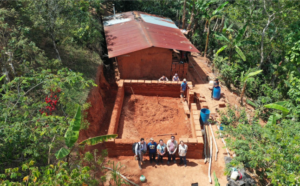 It’s been just a few hours since I left the warmth and rain of Chiquimula. Now I sit in the lobby of the Hotel Barceló in the middle of the bustling Ciudad de Guatemala. On the surface there appears to be such stark differences between the two places, but when I really look around I can still see what Onelia described to me as an issue that affects the entire country as a whole – extreme wealth and extreme poverty. While I sit in air conditioning, listening to the jazz music playing overhead all I can think about are the families that everyday are facing issues of water and food insecurity as well as shelter.
It’s been just a few hours since I left the warmth and rain of Chiquimula. Now I sit in the lobby of the Hotel Barceló in the middle of the bustling Ciudad de Guatemala. On the surface there appears to be such stark differences between the two places, but when I really look around I can still see what Onelia described to me as an issue that affects the entire country as a whole – extreme wealth and extreme poverty. While I sit in air conditioning, listening to the jazz music playing overhead all I can think about are the families that everyday are facing issues of water and food insecurity as well as shelter.
In my travels around both Mexico and Guatemala on this trip, I’ve seen that most of these resources are densely packed into the main urban areas, with people on the outskirts of these urban centers being lost or forgotten. This is true for the pueblos of both El Tular and Dos Quebradas, but especially El Tular who has no access to running water. Women of the household are often the ones to walk miles from their homes down to a safe water source and walk back up with just a gallon or two at a time. Often there are restrictions on what the water can be used for with some sources safe for cooking and drinking and others that are not; some that you can only use for cooking/drinking and never for bathing. PYD is currently working on a project to help this community begin to collect rainwater. With the rainy season beginning in May and lasting through September, there is a good chance many families will see a decent harvest. There are many steps to make this happen, but the first is improving homes and making it possible to collect water from the roofs. Right now many of the homes are constructed with banana stalks and leaves, including the roofs, which makes people vulnerable to weather and disease carrying pests.
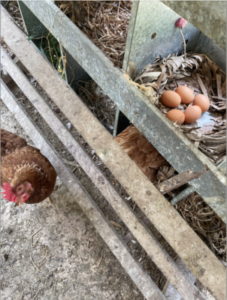 Currently, there are 40 families receiving support from PYD in this capacity, but there are 200 or more within all of El Tular. Onelia says it’s just the beginning because PYD is committed to making this an option for more families in the future. While visiting El Tular I had the chance to see the process at multiple stages. Below is generally how the process goes:
Currently, there are 40 families receiving support from PYD in this capacity, but there are 200 or more within all of El Tular. Onelia says it’s just the beginning because PYD is committed to making this an option for more families in the future. While visiting El Tular I had the chance to see the process at multiple stages. Below is generally how the process goes:
It was incredible to see families working together to build their own homes out of adobe – a form of brick-making that includes clay, sand, water and grass. In Tucson, AZ, my homebase, we have countless historic adobe homes so it was beautiful to see how another community in a different country practices this architectural style.
Once these families go through the process, PYD hopes that this will impact migration rates. With so little resources, people often make the difficult choice to find a new way of life in a different city or different country altogether. If PYD can provide the access they need to precious resources then maybe the chances they will stay will increase and ultimately positively impact the local economy. One of the main missions of the organization I work with, School Garden Workshop, is to increase self-efficacy in our community. When people have skills, knowledge, and access to resources they are able to see themselves as having agency in the face of adversity, and therefore able to be the driver in their own lives. PYD is out here doing difficult, but truly authentic work, and I am so happy to be able to celebrate their successes and watch as they continue to change lives in Guatemala.
All opinions expressed by the program participants are their own and do not represent nor reflect official views from the Bureau of Educational and Cultural Affairs of the U.S. Department of State, or of the Institute for Training and Development, Inc.

